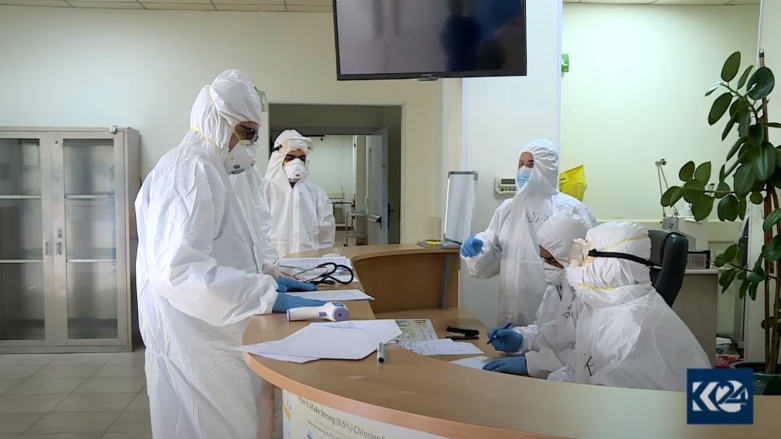Kurdistan Region reports 574 new COVID-19 cases, as Duhok infections rise

ERBIL (Kurdistan 24) – The Kurdistan Region Health Minister, Saman Barzinjy, on Sunday announced 574 new coronavirus cases, as he warned that the virus is spreading fast in Duhok province.
In a press conference held in Erbil, the minister said that "out of a total of 5,413 new tests, we diagnosed 574 new cases during the past 24 hours," pointing out that the highest number of infections was 336, in Duhok province.
"Unfortunately, [Duhok] is witnessing a fast spread of the virus."
Barzinjy expressed his condolences to the families of the 21 patients who passed away due to the disease. Of the total, seven of the coronavirus fatalities were in Erbil, eleven in Sulaimani, two in Duhok, and one in Halabja province.
The minister also outlined the total number of infections registered since the outbreak of the pandemic in the Kurdistan Region: 32,210 confirmed cases, including 20,492 recoveries, 1,207 deaths, and 10,511 patients still under treatment.
Barzinjy reiterated calls from public health officials to citizens in the region to adhere to preventive measures and guidelines, saying, "It is the best solution to prevent the spread of the virus."
On Saturday, Kurdistan Region Prime Minister, Masrour Barzani, allocated 500 million IQD to the Health Directorate of Halabja province. The decision came a day after the head of the coronavirus combating team in Halabja, Jihad Ibrahim, announced that budget shortfalls had hampered containment efforts, leading to a rise in cases.
Ibrahim said in a press conference that 50 percent of the tests conducted in the province come back as positive and that the rate of infections in Halabja is increasing by the day.
At 50 percent, the test positivity rate, as it is referred to, indicates that transmission rates are notably high. The number is usually under 15 percent across the region, and, according to data by the Ministry of Health, about 20 percent nationally.
The World Health Organization (WHO) advises that a test positivity rate of less than five percent for two weeks running is one of several critical indicators that the disease is under control in a region.
"There is only three health personnel in the [Halabja] testing laboratory, unable to handle the load as the lab can only process 300 test a day," Ibrahim said of Halabja's testing capacity.
He explained further that any patient who needs a plasma transfusion must be sent to Sulaimani, creating a "big" problem.
The official called on the KRG to provide Halabja medical equipment and supplies to fight the pandemic more effectively.
Editing by Khrush Najari
